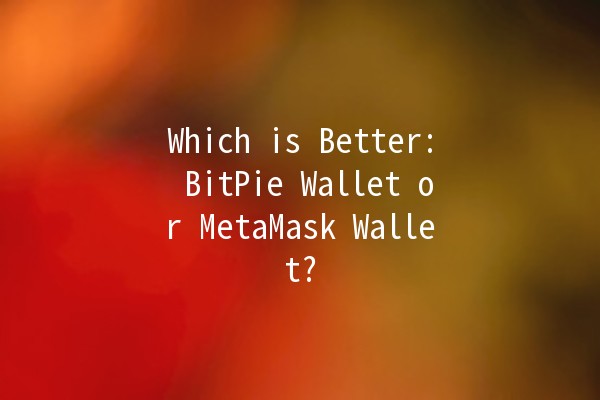
In the rapidly evolving world of cryptocurrency, wallet selection can significantly impact your digital asset management experience. Among the many wallet options available, BitPie and MetaMask have emerged as popular choices. Both cater to distinct user needs, making it crucial to understand their unique features and functionalities. This article delves into the intricacies of BitPie and MetaMask, examining their strengths, weaknesses, and ideal use cases.
Understanding the Basics of Crypto Wallets

Before diving into the comparison of BitPie and MetaMask, it is essential to grasp what a cryptocurrency wallet is. In simple terms, a crypto wallet is a software application or hardware device that allows users to store, send, and receive cryptocurrencies. Unlike traditional wallets that hold physical currency, crypto wallets store the private keys required to access and manage your digital assets.
Types of Crypto Wallets
Crypto wallets can be categorized into two main types:
BitPie Wallet Overview
Features of BitPie Wallet
BitPie Wallet offers various features designed to enhance user experience:
MultiCurrency Support: BitPie accommodates a wide range of cryptocurrencies, making it suitable for users with diverse portfolios.
UserFriendly Interface: The wallet’s intuitive design makes it accessible to both novice and experienced users.
BuiltIn DApps: BitPie provides access to decentralized applications (DApps), allowing users to interact with various blockchain services directly from the wallet.
Enhanced Security Measures: BitPie employs robust security measures, such as password protection and twofactor authentication (2FA), to safeguard your assets.
Pros and Cons of BitPie Wallet
Pros:
Easy to use, even for beginners.
Supports numerous cryptocurrencies.
Direct access to DApps.
Cons:
Limited advanced features compared to more established wallets.
Relatively new in the market, which may raise concerns about longterm reliability.
MetaMask Wallet Overview
Features of MetaMask Wallet
MetaMask has gained significant traction in the crypto community and offers features that cater to Ethereum users:
Ethereum Integration: MetaMask is primarily an Ethereum wallet, designed for storing Ether and ERC20 tokens.
Browser Extension: Its browser extension allows users to interact seamlessly with decentralized finance (DeFi) platforms and NFTs.
User Control: MetaMask puts users in control of their private keys, enhancing security and ownership.
MultiAccount Support: Users can manage multiple Ethereum accounts within a single interface, making it convenient for managing various portfolios.
Pros and Cons of MetaMask Wallet
Pros:
Strong integration with Ethereumbased applications.
Active community support and frequent updates.
Highly secure, with usercontrolled private keys.
Cons:
Limited to Ethereum and ERC20 tokens.
The setup process might be daunting for beginners.
Comparison of BitPie and MetaMask Wallets
User Experience
Both wallets prioritize user experience but cater to different types of users:
BitPie Wallet: With its multicurrency support and simple interface, it suits users who prefer managing various cryptocurrencies in one location.
MetaMask Wallet: Aimed primarily at Ethereum users, it offers a more advanced experience for those looking to engage with DeFi protocols and NFTs.
Security
When it comes to security, both wallets have strong measures in place:
BitPie Wallet: Implements security features like password protection and 2FA, but as a hot wallet, it carries inherent risks.
MetaMask Wallet: Prioritizes user control over private keys, ensuring that users are responsible for the security of their assets.
Productivity Improvement Tips for Cryptocurrency Users
Managing cryptocurrencies can be challenging, but applying certain techniques can enhance your overall productivity. Here are five specific tips to streamline your crypto experience:
Explanation: Enable 2FA for all your wallets and exchanges to add an extra layer of security.
Example: If you're using BitPie or MetaMask, enable 2FA through an authenticator app. This step significantly reduces the risk of unauthorized account access.
Explanation: Keep your wallets organized based on their purpose.
Example: Use BitPie for diverse investments and MetaMask for Ethereumbased activities. This separation ensures easier tracking and management.
Explanation: Stay informed about market changes that can affect your cryptocurrency investments.
Example: Utilize apps or browser extensions that send alerts on price changes for your favorite cryptocurrencies. This proactive approach enables prompt decisionmaking.
Explanation: Leverage decentralized applications to enhance your crypto transactions.
Example: With MetaMask, access DeFi platforms for yield farming or liquidity pools. These tools can help maximize your returns while managing your portfolio effectively.
Explanation: Have a backup strategy for your wallets and private keys.
Example: Use a hardware wallet to store a portion of your investments and write down your recovery phrases in a secure location. This practice ensures that you don’t lose access to your assets in case of device failure or loss.
Frequently Asked Questions (FAQs)
The primary difference lies in their supported currencies and use cases. BitPie supports multiple cryptocurrencies, while MetaMask is designed for Ethereum and ERC20 tokens.
BitPie Wallet implements security features like password and 2FA; however, as a hot wallet, it carries certain risks. Users should always follow best security practices.
MetaMask primarily supports Ethereum and ERC20 tokens. While it cannot store other cryptocurrencies, users can manage multiple Ethereum accounts.
To recover your BitPie Wallet, you need your recovery phrase (if enabled) or any backup you created during the wallet setup process. Always ensure your recovery phrase is stored securely.
Yes, both wallets incur transaction fees, often determined by the blockchain network you are operating on. Be sure to check network fees before initiating transactions.
For beginners, BitPie Wallet may present a more straightforward and userfriendly experience, given its multicurrency capabilities and easytonavigate interface. MetaMask can be more complex, particularly for users unfamiliar with Ethereumbased transactions.
Choosing between BitPie and MetaMask ultimately depends on your specific needs and preferences. If you require a wallet that supports various cryptocurrencies with a userfriendly interface, BitPie may be the more suitable option. However, if you are focused on engaging with Ethereum and DeFi applications, MetaMask is an excellent choice due to its robust integration and features.
As the cryptocurrency landscape continues to expand, your wallet choice can significantly influence your digital asset management experience. Understanding the strengths and weaknesses of your options will empower you to make informed decisions, ensuring a more efficient and secure crypto journey.

